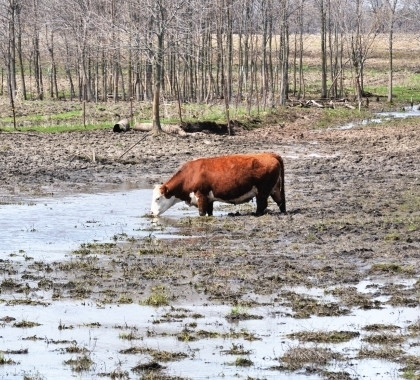A federal court upheld the right of a New Mexico family of ranchers to access water on federal lands, determining the right dated back to the Territory of New Mexico.
Susan G. Braden, chief judge of the U.S. Court of Federal Claims, ruled the U.S. Forest Service (USFS) took property from the ranchers by restricting access to water for their cattle, a right to access they held before 1905 and which the USFS had allowed to continue from 1910 to 1989. Braden filed her decision in Sacramento Grazing Association, Inc., et al., Plaintiffs, v. The United States, Defendant on November 3, 2017.
The 16 federal claims judges have nationwide jurisdiction over a variety of cases involving monetary claims against the federal government, including cases about “takings.” Taking private property for public use without just compensation is forbidden by the Fifth Amendment to the Constitution.
Plants, Animals Versus People
The case was brought by the Sacramento Grazing Association (SGA), a family-owned ranching enterprise with roots dating back to 1885.
In the 1980s, USFS began fencing off some bodies of water in the Lincoln National Forest to protect critical habitat of the Sacramento Mountains Thistle and two other endangered species. These areas included bodies of water SGA had long used.
Throughout the 1990s, SGA and USFS battled and negotiated over SGA’s right to continue using the water. In 2004, the U.S. Fish and Wildlife Service issued a biological opinion recommending livestock be permanently excluded from fenced-off areas on the forest’s Sacramento Allotment, in order to protect the endangered species. This decision prompted James and Frances Goss, the owners of the family ranch, to file a lawsuit requesting compensation for the USFS taking of property rights to the water.
Rights ‘Physically Taken’
Braden ruled the ranchers had established property rights by having “made continuous beneficial use of stock water sources” predating federal ownership. Braden also agreed with the ranchers’ claim the water was “physically taken” when USFS blocked their livestock from accessing the water to preserve endangered species.
Braden found the initial taking occurred in 1998 when the U.S. Forest Service began restricting SGA’s access to water by erecting “exclosures,” pens designed to exclude cattle from grazing habitat or nesting grounds of the Sacramento Mountains Thistle, the Southwestern Prickly Poppy, and the Mexican Spotted Owl.
“Although water sometimes flowed outside the exclosures, which SGA’s cattle drank, nevertheless, the [Forest Service] is liable for a taking because a permanent physical occupation does not require that in every instance the occupation be exclusive, or continuous and uninterrupted,” Braden wrote in her decision. “Governmental action short of acquisition of title or occupancy has been held, if its effects are so complete, as to deprive the owner of all or most of his interest in the subject matter, to amount to a taking.”
SGA’s lawsuit, initially filed in 2004 by members of the Goss family, has taken more than a decade to resolve. James and Frances Goss did not live to see SGA’s victory, having passed away in 2015 and 2017, respectively, before the court ruled.
State Property Law Primacy
Federal court decisions have regularly upheld property rights recognized by state law. Braden determined New Mexico law grants SGA the right “to beneficial use of stock water in the Lincoln National Forest.”
Instead of requiring USFS to compensate SGA for its lost rights immediately, Braden said “both parties should undertake a renewed effort to ascertain whether alternative water sources can be made available to SGA to allow this family enterprise to continue in the cattle business on a viable basis.”
If such remedial action is not undertaken, the federal claims court may award financial damages to SGA.
‘Welcome’ Decision
Jonathan Wood, an attorney with the Pacific Legal Foundation, a public interest law firm, says the court’s ruling protects constitutionally guaranteed property rights in the face of claims of potential public benefits.
“The Court’s decision is a welcome confirmation that the Constitution does not permit the government to destroy property rights and unfairly impose the costs of providing a public benefit on a private property owner,” Wood said. “Instead, the Constitution requires the government to pay for those benefits by compensating people for the property taken from them.
“That’s true whether the property is land taken to build a highway or water rights taken to improve habitat on federal land,” said Wood. “If we value the public benefit, we should pay for it, not force someone else to do so without their consent.”
Wood says the Goss case highlights the fact many government agencies ignore legitimate property rights when the latter conflict with agency goals.
“The case is also a sad reminder that most government agencies are antagonistic to this basic constitutional principle,” Wood said. “Rather than simply paying the Goss family for the taking of their property, the U.S. Forest Service put the family through decades of endless bureaucracy and litigation.”
Joe Barnett ([email protected]) writes from Arlington, Texas.

